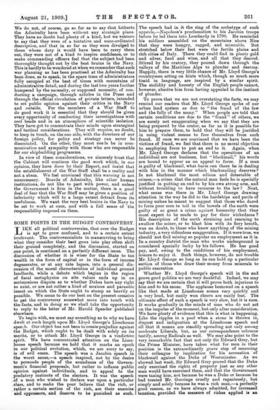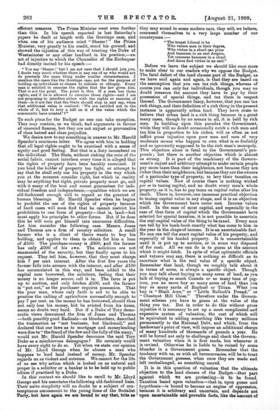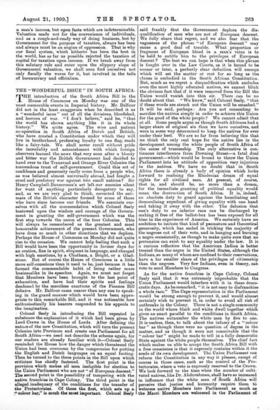SOME POINTS IN THE BUDGET CONTROVERSY.
IKE all political controversies, that over the Budget
.4 is apt to grow confused, and to a certain extent irrelevant. The controversialists in manceuvring to bring what they consider their best guns into play often shift their ground completely, and the discussion, started on one point, is continued on a perfectly different issue. The discussion of whether it is wiser for the State to tax wealth in the form of capital or in the form of income degenerates, or at any rate lapses, into a general dis- cussion of the moral characteristics of individual ground landlords, while a debate which begins in the region of fiscal metaphysics on site values ends up in an acrimonious dispute as to whether Dukes have any right to exist, or are not rather a kind of noxious and parasitic insect on which the State ought to stamp as heavily as possible. -We mean to do our best on the present occasion to get the controversy somewhat more into touch with the facts, and in doing so we shall take the opportunity to reply to the letter of Mr. Harold Spender published elsewhere.
To begin with, we must say something as to why we have dwelt at such length upon Mr. Lloyd George's Liinehouse spee,_li. Our object has not been to create prejudice against the Budget, which ought to be dealt with solely on its merits, or to attack Mr. Lloyd George in a vindictive spirit. We have concentrated attention on the Lime- house speech because we hold that it marks an epoch in our political evolution, which, we are sorry to say, is of evil omen. The speech was a Jacobin speech in the worst sense,—a speech inspired, not by the desire to persuade people of the soundness of the Govern- ment's financial proposals, but rather to inflame public opinion against individuals, and to appeal to the predatory instincts of the electors. It was the speech of a man who wished to declare war upon a particular class, and to make the poor believe that the rich, or rather a certain section of the rich, are their enemies and oppressors, and deserve to be punished as such.
The speech had in it the ring of the archetype of such appeals,—Napoleon's proclamation to his Jacobin troops before he led them into Lombardy in 1796. He reminded his soldiers assembled on the mountains above Nice that they were hungry, ragged, and miserable. But stretched below their feet were the fertile plains and rich cities of Italy. There they could find in plenty gold and silver, food and wine, and all that they desired. Stirred by his oratory, they poured down through the valleys of the Maritime Alps to plunder and destroy. Happily, there is very little chance of Mr. Lloyd George's countrymen acting on hints which, though so much more timid in language, are inspired by a similar spirit. The stolidity and honesty of the English people cannot, however, absolve him from having appealed to the instinct of plunder.
To prove that we are not overstating the facts, we may remind our readers that Mr. Lloyd George spoke of our urban land system as due to "the fraud of the few and the folly of the many." When people are told that certain conditions are due to the " fraud " of others, we are surely not exaggerating when we say that they are being prepared by the orator, as far as it is possible for him to prepare them, to hold that they will be justified in using violent means to free themselves from such fraud. If once we are convinced that we have been the victims of fraud, we feel that there is no moral objection to employing force to put an end to it. Again, when Mr. Lloyd George declares that the operations of an individual are not business, but "blackmail," his words are bound to appear as an appeal to force. If a man is guilty of blackmail, what harm can there be in dealing with him in the manner which blackmailing deserves ? Is not blackmail the most odious and detestable of crimes,—a crime that the natural man feels he is specially justified in putting an end to by his own strong arm, and without troubling to have recourse to the law ? Next, what sense was there in Mr. Lloyd George drawing attention in the way he did to the hardships and perils of mining unless he meant to suggest that those who dared to force poor men to toil in the bowels of the earth were guilty of so great a crime against humanity that they must expect to be made to pay for their wickedness ? His description of the earth straining and yearning to swallow the miner, or to blast him with its fiery breath, was no doubt, to those who know anything of the mining industry, a very ridiculous exaggeration. If it were true, we should not find mining so popular an employment as it is. In a country district the man who works underground is considered specially lucky by his fellows. He has good pay, and, owing to the conditions of his employment, leisure to enjoy it. Such things, however, do not trouble Mr. Lloyd George so long as he can hold up a particular section of those who draw their money from minerals to public execration.
Whether Mr. Lloyd George's speech will in the end prove good politics we are very doubtful. Indeed, we may say that we are certain that it will prove both injurious to him and to his cause. The applause bestowed on a speech like that made at Limehouse comes very quickly and is very loud, but easily won cheers are easily lost. The ultimate effect of such a speech is very slow, but it is sure. It works gradually in the minds of men who do not act on the impulse of the moment, but only after consideration. We have plenty of evidence that this is what is happening. Like the ripples in a pool when a stone is thrown in, disgust and indignation at the Limehouse speech and all that it means are steadily spreading not only among moderate Liberals, but, as our correspondence columns testify, among Radicals as well. We may also point to the very remarkable fact that not only Sir Edward Grey, but the Prime Minister, have taken what for men in their position is the extraordinarily grave step of censuring their colleague by implication for his accusation of blackmail against the Duke of Westminster. As we showed last week, Sir Edward Grey proved that the Duke only exercised the rights of property just as any other man would have exercised them, and that the Government were taxing him, not because he was a Duke or because he had treated Mr. Gorringe cruelly and rapaciously, but simply and solely because he was a rich man,—a perfectly good reason, as we have always admitted, for increased taxation, provided the measure of riches applied is an efficient measure. The Prime Minister went even further than this. In his speech reported in last Saturday's papers he dealt at length with the Gorringe ease, and when one of his audience cried " Shame! " the Prime Minister, very greatly to his credit, stood his ground, and showed the injustice of this way of treating the Duke of Westminster or any other landlord in his position,—au act of injustice to which the Chancellor of the Exchequer had directly incited by his speech :— "You say Shame!' but I am not sure that I should join you. I doubt very much whether there is any one of us who would not do precisely the same thing under similar circumstances. I mention the cases like the Gorringe case, not for the purpose of holding up individuals or classes to ridicule or obloquy. Every man is entitled to exercise the rights that the law gives him. That is not the point. The point is this If a man has those rights, and if he is allowed to exercise those rights—and I am not proposing to interfere either with the rights or exercise of them—is it not fair that the State should step in and say, when that additional value is realised: We are entitled not to the whole of it, but to levy a toll on it of the value which the community have created' ?"
To such pleas for the Budget no one can take exception. They may contain, as we think, bad arguments in favour of unsound finance, but they are not unjust or provocative of class hatred and class prejudice.
We desire now to say something in answer to Mr. Harold Spender's courteous letter. We agree with him in holding that all legal rights ought to be exercised with a sense of equity and good feeling. But that is a duty incumbent on the individual. The State, without risking the ruin of the social fabric, cannot interfere every time it is alleged that the rights of property have been harshly exercised. If you bind the holder of property too tight, or attempt to say that he shall only use his property in the way which you at the moment consider right, but which in reality may be anything but right, private property must go, and with it many of the best and surest guarantees for indi- vidual freedom and indepeudence,—qualities which we are old-fashioned enough still to regard as the greatest of human blessings. Mr. Harold Spender when he begins to prohibit the use of the rights of property because of hard cases will soon find that he cannot restrict his prohibition to one form of property—that is, land—but must apply his principles to other forms. But if he does this he will soon get himself into enormous difficulties. Let him consider the following case. Messrs. Jones and Thomas are a firm of country solicitors. A small farmer who is a. client of theirs wants to buy his holding, and applies to them to obtain for him a loan of £500. The purchase-money is £800, find the farmer has only £300 of his own. The solicitors are not enamoured of the security, but they finally agree to his request. They tell him, however, that they must charge him 7 per cent. interest. After the first five years the farmer falls into arrears with the interest, and after £100 has accumulated in this way, and been added to the capital sum borrowed, the solicitors, feeling that their money is no longer secure, call it in. The farm is put up to auction, and only fetches £500, and the farmer is "put out," as the purchaser requires possession. That the poor man, whose only fault is not to be able to practise the calling of agriculture successfully enough to pay 7 per cent. on the money he has borrowed, should thus not only lose his money, but be evicted from his home, seems no doubt very hard. But if a Duke of Tory demo- cratic views denounced the firm of Jones and Thomas —both possibly good Radicals—as bloodsuckers, described the transaction as "not business, but blackmail," and declared that our laws as to mortgage and moneylending were due to" the fraud of the few and the folly of the many," would not Mr. Harold Spender denounce the said Tory Duke as a mischievous demagogue ? He certainly would have every right to do so. Yet when we state our opinion of Mr. Lloyd George when he abuses a man who happens to lend land instead of money, Mr. Spender regards us as violent and extreme. We cannot for the life of us see why action which is looked on as natural and proper in a solicitor or a banker is to be held up to public odium if practised by a Duke. In this context we should like to recall to Mr. Lloyd George and his associates the following old-fashioned lines. Their naive simplicity will no doubt be a subject of con- temptuous amusement to the young lions of the Socialist Party, but 'here again we are bound to say that, trite as they may sound to some modern ears, they will, we believe, commend themselves to a very large number of our countrymen :— "The truest Liberal is he
Who values men in their degree, Who virtue in a churl can prize And baseness in an earl despise, Yet censures baseness in a churl And dares find virtue in an earl."
Before we leave the subject we should like once more to make clear to our readers why we oppose the Budget. The fatal defect of the land clauses part of the Budget, as we have said again and again, is that they are based on the assumption that you can tax rich things, whereas of course you can only tax individuals, though you may no doubt measure the amount they have to pay by their possession of special things, and tax them in respect thereof. The Government fancy, however, that you can tax rich things, and their definition of a rich thing in the present instance is apparently urban land. They have come to believe that urban land is a rich thing because in a great many cases, though by no means in all, it is held by rich men. In building upon this paradox the Government, while they will no doubt occasionally catch a rich man and tax him in proportion to his riches, will as often as not inflict gross injustice upon poor men and men of very moderate means who happen to own what is so foolishly and so ignorantly supposed to be the rich man's monopoly. This objection alone is fatal to the Government's pro- posals; but there is another objection which is almost as strong. It is part of the machinery of the Govern- ment's unjust and arbitrary attempt to make certain people pay more taxes than their neighbours, not because they are richer than their neighbours, but because they are the owners of a particular type of property, to levy their taxation on capital values. Now of course there is nothing wicked per se in taxing capital, and no doubt every man's whole property, as it is, has to pay taxes ou capital value after his death. There is, however, one immense practical objection to taxing capital value in any shape, and it is an objection which the Government have never met. Income values itself. In the case of most capital, and especially in the case of that form of capital which the Government have selected for special taxation, it is nob possible to ascertain the real capital value of the thing to be taxed. Every man can tell by his bank-book exactly what has come to him in the year in the shape of income. It is an ascertainable fact. No one can tell the exact capital value of his property, and especially of his landed property. It is unascertainable until it is put up to auction, or in some way disposed of for cash. All we can do is to guess at the amount which it might fetch. In spite of what optimistic officials and valuers may say, there is nothing so difficult as to ascertain what is the real value of a specific object. Remember that land, though we roughly talk about it in terms of acres, is always a specific object. Though you may talk about buying so many acres of land, as you talk of buying so much- Consols or so many tons of pig. iron, you no more buy so many acres of land than you buy so many yards of Raphael or Titian. What you buy is "Black Acre," or "Little Bullock's Pound," or " Chestnut Hill Close." Therefore under the Govern- ment scheme you have to guess at the value of the thing you tax. But in order to do this without gross injustice it is necessary to set up a most complicated and expensive system of valuation, the cost of which will be equivalent to adding something like twenty millions permanently to the National Debt, and which, from the landowner's point of view, will impose an additional charge of many hundreds of thousands of pounds a year. He will be forced not only to challenge and check the Govern- ment valuation when it is first made, but whenever it is revised. Otherwise he is liable to be ruined by some blunder in a Government guess. Remember that the tendency with us, as with all bureaucracies, will be to treat the Government guesses, when once they are made and left unchallenged, as something sacred.
It is in this question of valuation that the ultimate objection to the land clauses of the Budget—that part against which we are protestiug—is to be found. Taxation based upon valuation—that is, upon guess and hypothesis—is bound to become an engine of oppression, because it is arbitrary and uncertain, and depends not upon ascertainable and. provable facts, like the amount of a man's income, but upon facts which are indeterminable. Valuation made not for the convenience of individuals, and as a rough-and-ready way of doing business, but by Government for the purpose of taxation, always has been and always must be an engine of oppression. That is why our fiscal system, which hitherto has been the best in the world, has as far as possible rejected the taxation of capital for taxation upon income: If we break away from this salutary rule and enter upon the slippery slope of Government valuation, we shall soon find ourselves not only fiscally the worse for it, but involved in the toils of bureaucracy and officialism.








































 Previous page
Previous page